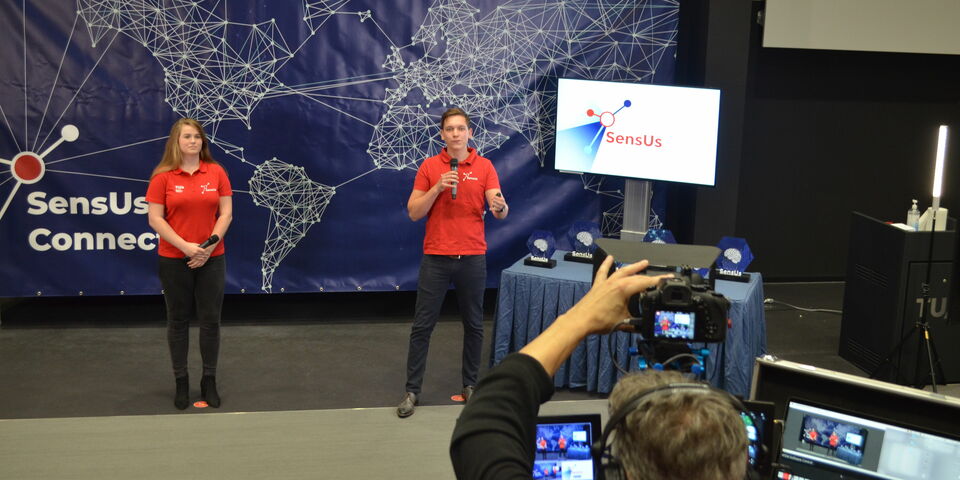SensUs goes ‘hybrid’
UPDATE: BECAUSE MULTI-DAY EVENTS INVOLVING OVERNIGHT STAYS ARE CURRENTLY NOT ALLOWED, SENSUS WILL BE A FULLY ONLINE EVENT THIS YEAR. SensUs, the international student competition devoted to biosensors and organized every year by TU/e, will be held in August as a hybrid event. Some of the 140 participants will be accommodated corona-proof in small tents on the campus, while the remainder will be limited to online attendance. The assignment for the teams is to develop a handy sensor capable of revealing the flu virus in saliva.
The hybrid event, which brings to a close eight months' work, will take place in the week of August 30th. In true corona style, all plans are subject to change, tells Petra Aantjes, the PR person for the team of organizers. “As things currently stand, we'll be able to have a gathering of up to a hundred people. Since there are already thirty of us and we'll have speakers and other guests as well, sixty participants can join us in person.” As in previous years - with the exception of last year when the event was held in its entirety online - they will be accommodated on the campus.
With a pandemic to take into account, there won't be any communal tents or cabins, instead participants will have their own festival tents, to be spaced as per the rules 1m50 apart. These will be bought in bulk at the Decathlon sports store, adds fellow team member Renate Janssen. “We did look into whether we'd do better to hire them, but buying them for 25 euros a piece was simply the cheapest option.” Only the team from China, she says, has already announced that it definitely cannot come. The other thirteen teams, coming from the US, Canada and Egypt and elsewhere, will be decided upon next week, says Janssen. “But if in August the rules are relaxed, we may still decide to increase the number of participants.”
Flu virus
The assignment set for this year's SensUs competition - design a biosensor to reveal the flu virus (influenza) in saliva - has been prompted by the current pandemic. “We want to maximize our preparedness for any subsequent pandemic, but also for local flu epidemics,” explains Aantjes. “We understand from experts that influenza is a probable candidate for a new pandemic because it mutates so quickly. And so it is useful to keep a watchful eye on the presence of this virus in the population.” The thinking is that an easy saliva test, which doesn't involve any unpleasant procedures in nose or throat, can help achieve this.
On the morning of Friday September 3rd, the sensors of the teams present in person will be tested in the Vertigo building. Earlier that week the stay-at-home teams will be asked to present their work in an online session, tells Janssen. “Each team will be assigned two independent assessors, present on site, to carry out this task.” The closing session on Friday afternoon, with the teams' pitches and the awards ceremony, will be held in the Atlas building. This will be another hybrid happening those interested can attend online. Likewise, the workshop on biosensors for influenza held on the afternoon of Monday August 30th will be open for online attendance by anyone who is interested.
Experience
Organizing an international event with both offline and online elements is no easy matter, admits Aantjes. “Of course, there is a lot of uncertainty and the colors of countries on the corona map are constantly changing. But we certainly want to give our online participants just as good an experience as those who are able to come to Eindhoven. This kind of hybrid event is a big challenge for our team of organizers, after all this is our first experience of organizing such an event.”


Discussion